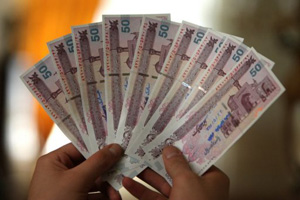 Reuters: Iran is receiving long overdue payments for its oil exports to India as two major buyers have started using a Turkish bank to get around U.S.-led moves to isolate the Islamic Republic, industry sources said on Monday.
Reuters: Iran is receiving long overdue payments for its oil exports to India as two major buyers have started using a Turkish bank to get around U.S.-led moves to isolate the Islamic Republic, industry sources said on Monday.
 NEW DELHI/TEHRAN, Aug 1 (Reuters) – Iran is receiving long overdue payments for its oil exports to India as two major buyers have started using a Turkish bank to get around U.S.-led moves to isolate the Islamic Republic, industry sources said on Monday.
NEW DELHI/TEHRAN, Aug 1 (Reuters) – Iran is receiving long overdue payments for its oil exports to India as two major buyers have started using a Turkish bank to get around U.S.-led moves to isolate the Islamic Republic, industry sources said on Monday.
Iran’s biggest Indian customer, state-run Mangalore Refinery and Petrochemicals Ltd (MRPL) , has made three payments totalling at least 60 million euros through Turkey’s state-controlled Halkbank with a view to using that channel to overcome the blockage, industry sources told Reuters.
But the refiner, which was confident of smooth imports from Iran, has not yet received the crude supply plan for the month, said two sources with knowledge of the matter.
India has been largely unable to pay Iran for oil since December when the Reserve Bank of India halted a clearing mechanism under U.S. pressure to crack down on doing business with Iran.
Some payments were made through Germany-based Europaeisch-Iranische Handelsbank (EIH or European-Iranian Trade Bank), a conduit that was also halted under U.S. pressure.
Debts now amount to some $5 billion.
Washington wants to isolate Tehran which it believes is developing nuclear weapons, something the Islamic Republic denies.
While the U.S.-led sanctions drive does not stop Iran from selling its oil, it has become increasingly difficult for Tehran to receive petrodollars via foreign banks.
MRPL’s managing director last week said his firm owed the National Iranian Oil Co. (NIOC) some $2.9 billion of which $1.9 billion is overdue.
Essar Oil , the second biggest Indian buyer of Iranian oil, has made a small payment to NIOC via Halkbank and Hindustan Petroleum would do so on Tuesday, sources said.
Essar’s total debt to Iran as of June 30 was about $2 billion, of which $800 million was payable, the company’s head of finance Suresh Jain said last month.
“Different options are being worked out to make payment for oil imports from Iran and oil companies are making payments for bona fide oil imports within the framework of existing international regulations,” said Alpana Killawala, chief general manager at Reserve Bank of India.
Senior Iranian officials, while urging India to solve the problem, have played down its significance.
Iran’s central bank Governor Mahmoud Bahmani said Tehran would not need Turkish help, while Iran’s ambassador to India said Turkey was one of several possible intermediaries.
“Turkey does not have any role in transferring Iran’s money from India,” the semi-official Mehr news agency quoted Bahmani as saying. “Iran itself will receive its debt arrears.”
Bahmani did not say how the payments would be made to Iran and the central bank was not immediately able to comment.
“Iran and India’s officials’ efforts to resolve the problem led to negotiations with two or three third parties of which Turkey was one,” Iran’s envoy to New Delhi Mehdi Nabizadeh told Mehr.
The spokesman for the energy committee in Iran’s parliament said lawmakers had urged the government to maintain a block on exports of crude to India until the payments problem was resolved, and said Turkey, a neighbour of Iran, could be key to settling the dispute.
“Apparently India was supposed to begin paying back its debt to Iran via Turkey and if this is done theoretically the suspension of Iranian crude exports to India should be halted,” Emad Hosseini told the semi-official Fars news agency.
Executives at Indian refineries said in late July they had still not received any crude oil supply notices for August after Iran told them it would stop shipments over the ballooning debt.
Tehran had previously warned India that supplies could be stopped if debts remain unpaid, but said it was continuing supply in order to defend its share of a market where it supplies 12 percent of demand.
The head of the Iranian National Oil Co., Ahmad Ghalebani, said on Sunday the problem had been solved and that the debt would begin to be paid “in the coming days”.
India imports some 400,000 barrels per day of Iranian crude. (Reporting by Nidhi Verma in New Delhi and Ramin Mostafavi and Hashem Kalantari in Tehran; additional reporting by Suvashree Dey Choudhury in Mumbai; writing by Robin Pomeroy; editing by Jason Neely)


